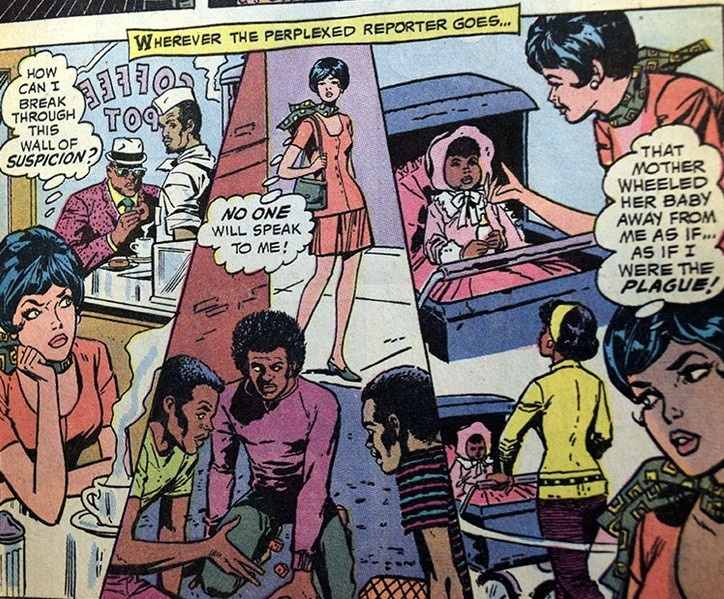In this large panel on page 3 of Superman’s Lois Lane: I Am Curious (Black), Lois is depicted contemplating the consistent rejection she receives from the black citizens of Metropolis when she tries to interview them for her newspaper story on the black experience.
Each of the three sections show her face as she moves from deep thinking to longing, to hopefulness, and to dejection as she speaks dramatically of her predicament. The words in her thought bubbles emphasize the injustice of the situation, with bolded words including “[wall of] suspicion,” “no one,” and “[the] plague.” Lois’s innocence as an archetype of the well-meaning white woman comes through in these messages, as she stutters through her own stunned and dejected thoughts, especially on the far right as she thinks about the woman steering away her child “as if…as if I were the plague,” the repetition of “as if” underscoring her sheer incredulousness that such a thing could be thought about her. The emphasis on her innocence paints a picture of racism as being a disagreement between two groups, both groups capable of acting against the other. As bell hooks discusses in Ain’t I a Woman, there was and still is a popular view that blacks and whites could end racism by forming meaningful relationships between races:
"The majority of us understood racism as a social evil perpetuated by prejudiced white people that could be overcome through bonding between black and liberal whites, through militant protest, changing of laws or racial integration" (hooks 120).
In this panel, the consistent, failed efforts of Lois Lane to reach out and make friendly connections with black people are presented as no fault of her own; she is earnest in trying to connect with black people, but is discriminated against because of the color of her skin. Lois assumes the identity of victimized white woman to whom black people are being unjustly hateful towards.
In these three images of Lois’s failed interactions, there is also a clear sense of Lois’s subconscious feelings of entitlement to the attention of black people, even though her emotional response is not of anger or possessiveness. Although Lois approaches people in the neighborhood with the same polite approach that she might use in trying to speak to white citizens for a story, Lois’s actual offensiveness lies in the feeling of being entitled to black people’s time, words, and environment. She never questions her right to profit from a story about the experience of being black, even though she is a white woman who does not interact with black people in her daily life.
hooks, bell. Ain't I a Woman: Black Women and Feminism. Boston, MA: South End, 1981. PDF.
